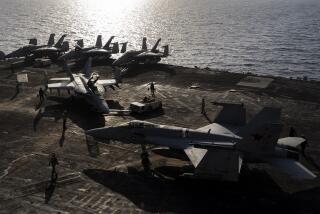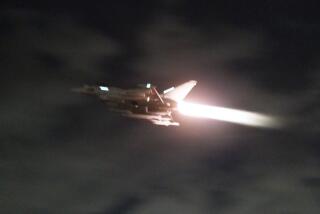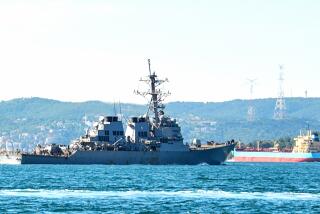Blunder Upon Blunder
- Share via
American policy in the Persian Gulf now rests on the tottering pillars of military unpreparedness and political misjudgment. If the stakes of the expanded U.S. commitment in the gulf weren’t so high, if American lives had not now been placed at such risk, the Reagan Administration’s startling ineptitude in allowing the situation to develop as it has would surely be seen as laughable. There’s nothing funny, though, about what now confronts the United States in the gulf. What is already a national embarrassment has the potential for becoming a national humiliation.
The Administration, after spending hundreds of billions of dollars to build the Navy of the future, is forced to face the fact that it lacks the means to deal with the weapons of the past. In the Persian Gulf those weapons specifically include a variety of anti-ship mines in the arsenal of Iran. Already one reregistered Kuwaiti tanker sailing under the U.S. flag has been damaged by a mine explosion. Americans can count it a blessing that the 401,000-ton tanker rather than one of its much smaller U.S. escort ships took the force of the blast. Had one of the escort vessels fallen victim to a mine, a naval officer in the area says, the harm to both ship and crew might well have been calamitous.
With the right equipment, the threat from mines can to a considerable extent be neutralized. But unlike the Soviet Union, which has moved three minesweepers into the gulf to protect its tankers, the United States conspicuously lacks that equipment. Even though the Navy is well on its way to the Reagan Administration’s goal of 600 ships, it currently can count no more than three minesweepers on active service. All of them are based at Charleston, S.C., thousands of miles from the Persian Gulf.
Specially equipped helicopters are also used to detect and detonate mines. Again, though, the United States currently has none in the gulf, and the prospects for shifting some there soon don’t seem bright. Kuwait, whose shipping the United States has gone into the gulf to defend, has indicated that it would rather not provide the basing facilities that would be needed to support helicopter minesweeping operations. In fact, Kuwait has made it clear that it doesn’t even want the U.S. ships that are escorting its reflagged tankers to enter its territorial waters. After soliciting American help, the Kuwaiti attitude now seems to be that whatever happens from here on out is strictly an American problem.
The militarily dangerous and politically ironic events of recent days have only underscored what became clear months ago. The Reagan Administration failed utterly to think through the implications and the potential consequences of its policy in the gulf. It failed to lay either the proper military or political foundation for trying to carry out what it so precipitously committed itself to doing. Least excusable of all, it deliberately avoided advising Congress of what it was up to until it had firmly committed the United States to a course that could be altered only at considerable political risk.
That this whole ill-conceived plan was motivated as much as anything else by an effort to recoup what had been lost by the exposure of the Administration’s scheme to sell arms to Iran seems self-evident. One blunder thus paved the way for another. The full cost of each has yet to be known.
More to Read
Sign up for Essential California
The most important California stories and recommendations in your inbox every morning.
You may occasionally receive promotional content from the Los Angeles Times.













